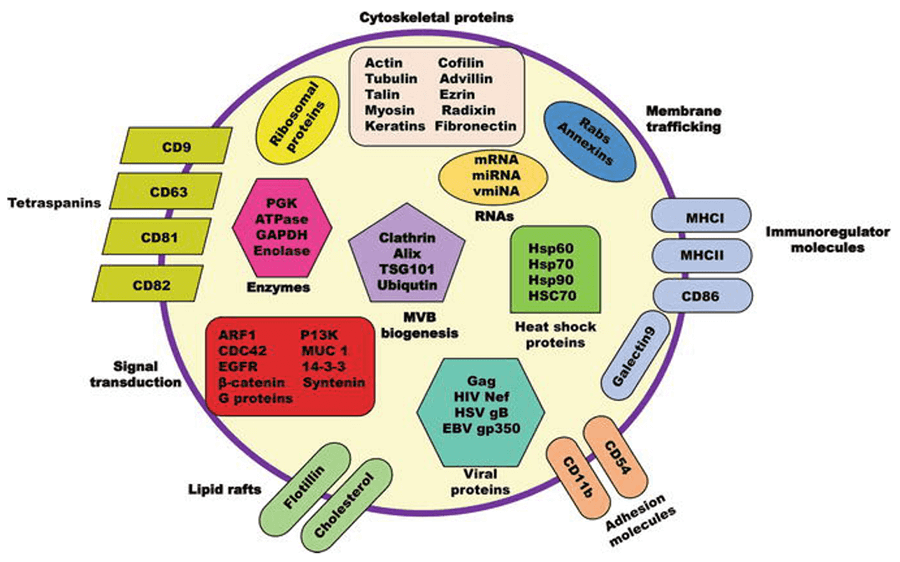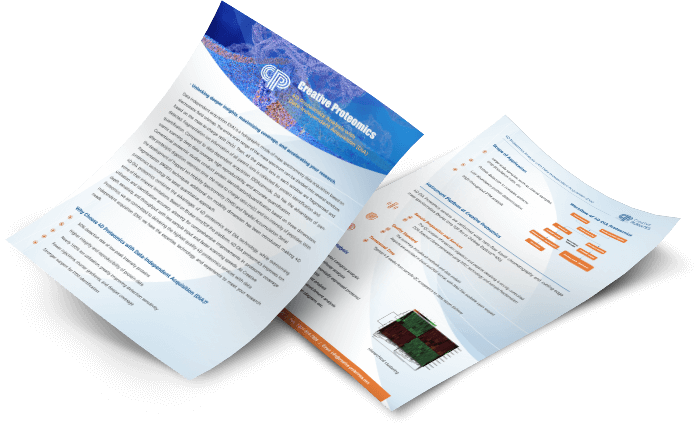Exosomes Proteomics Research Solutions
Exosomes (Exosomes) are extracellular vesicles, and endocytosis secreted small membrane vesicles in cells. Exosomes are multivesicular vesicles with lipid bimolecular structures widely present in various body fluids (blood, urine, milk, etc.) and cell culture supernatants. Furthermore, exosomes also carry proteins, modified proteins, lipids, metabolites, nucleic acids (miRNAs, mRNAs), and other active substances. Exosomes and their contents play an essential role in antigen presentation, tumor cell development, and neurogenic signal transduction. Thus large-scale exosome proteomic analysis can support biomarker discovery and clinical diagnosis.
 Composition of exosomes (Brennetta J. Nanomedicines 2018).
Composition of exosomes (Brennetta J. Nanomedicines 2018).
Data-independent acquisition (DIA) is a robust and reproducible proteomic technology for large-scale digital qualitative and quantitative research. The DIA mode divides the entire mass range into several sequential windows, and all precursor ions in each window were fragmented sequentially. Therefore, DIA overcomes the loss of low abundance peptide information for accurate quantification in the data-dependent acquisition (DDA) mode and avoids the drawback of targeted peptides in the selected reaction monitoring (SRM). An optimized throughput DIA workflow allowed for the efficient discovery and verification of candidate biomarkers simultaneously.
Our Exosomes Proteomics Research Solutions
Creative Proteomics uses DIA MS methods for proteomic analysis in biological fluid samples such as serum to assist your screening for potential candidate markers.
Workflow

Application
(1) As disease-specific biomarkers.
(2) Diagnostic and therapeutic strategies for metabolic and cardiovascular diseases, neurodegenerative diseases, and cancer.
(3) Regulation of immune-related diseases by exosomes, such as activating immune responses to enhance immunity.
(4) As carriers of drugs and disease treatment options, from therapeutic agents packaging to immune response modulation, with applications ranging from oncology to regenerative medicine.
(5) Exosomes from mesenchymal stem cells (MSC) can play a role similar to MSC therapy as a therapeutic regimen.
Data Analysis
| Exosome DIA Proteome | A variety of advanced data analysis & integrated analysis process meets various applications |
| Data analysis | Identification quantity statistics: protein identification and quantitative results statistics, PCA analysis, Wayne diagram analysis |
| Expression difference statistics: number of different results, volcano map, cluster heatmap |
| Biological function analysis: subcellular localization, domain analysis, GO function analysis, KEGG enrichment analysis, and interaction network, complex and module analysis, WGCNA phenotype and omics association analysis |
| Advanced data analysis | Biomarker Screening: Integrated machine learning |
| Molecular typing: protein genome analysis |
Technical Advantages
(1) The support of 4D technology is more suitable for exosome sample detection.
(2) Provide the process from exosome "extraction - characterization - multi-omics analysis - bioinformatics."
(3) Adopting Bruker's timsTOF Pro mass spectrometry platform, nearly doubled detection speed.
Recommended Combination
(1) Innovative research for biomarker research: large cohort screening of exosomes + machine learning + PRM target validation integrated solution.
(2) Multi-omics research: exosome proteome + exosome lipidome + exosome phosphorylation one-stop solution.
References:
- Synergistically Bifunctional Paramagnetic Separation Enables Efficient Isolation of Urine Extracellular Vesicles and Downstream Phosphoproteomic Analysis. ACS Appl Mater Interfaces. 2021
- The biology, function, and biomedical applications of exosomes. Science. 2020.
- Liping Zhao et al.Serum-Derived Exosomal Proteins as Potential Candidate Biomarkers for Hepatocellular Carcinoma ACS Omega. 6(1): 827–835. 2021.
* For Research Use Only. Not for use in the treatment or diagnosis of disease.

 Composition of exosomes (Brennetta J. Nanomedicines 2018).
Composition of exosomes (Brennetta J. Nanomedicines 2018).

 4D Proteomics with Data-Independent Acquisition (DIA)
4D Proteomics with Data-Independent Acquisition (DIA)